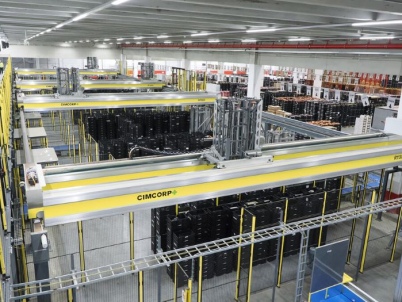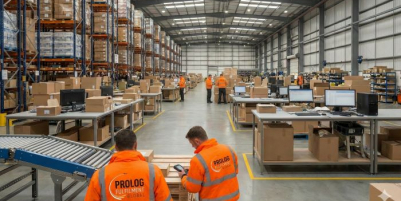-
Rite-Hite unveils new range of hydraulic kits to upgrade and extend dock leveller performance - February 19, 2026
-
REWE and Cimcorp automate fresh supply chain for Berlin supermarkets and stores - February 19, 2026
-
Q1 – A recovery period or time to fix, switch and scale? - February 19, 2026
-
NULOGY’S SHOP FLOOR SOFTWARE TO POWER COMPLETE CO-PACKING’SOPERATIONS - February 13, 2026
-
Why lead generation depends upon good content - February 13, 2026
-
Wallapop and Albatross Sign Strategic Partnership to Bring Real-Time AI Discovery to the Future of Consumer-to-Consumer Commerce - February 12, 2026
-
Thorworld ramp helps Hubergroup to streamline its unloading operation - February 6, 2026
-
TRACKER INNOVATION FROM QUECLINK TO BOOST STOLEN VEHICLE RECOVERY PERFORMANCE - February 4, 2026
-
Flexi Narrow Aisle hits 50! - January 29, 2026
-
DERRY BROS ATTRACTS RECORD NUMBERS OF FREIGHT CUSTOMERS SEEKING CUSTOMS SUPPORT - January 29, 2026
Picking is one of the activities in every warehouse that can make or break the efficiency of your whole logistics operation. Investing in new warehouse software to help get orders picked and out to your customers as quickly and accurately as possible is an important business decision and one that needs careful consideration.
Get it right and you can shorten order cycle times and offer customers shorter lead times to help give you a competitive edge. This is especially important for e-commerce businesses where fast, inexpensive delivery is a key purchase driver. To help you choose the best picking system for your business, here are some points to consider:
1. How flexible is the system?
Choosing a system that works with a variety of picking strategies will enable you to respond to a range of demands effectively. Chances are you deal with a variety of order sizes – from bulk shipments to single item e-commerce orders – each with different delivery options. You will need software that allows you to apply the most appropriate picking strategy in each case.
You will also need to be able to reprioritise the open order pool to help you meet demands at peak times. For instance why would you not choose to prioritise picks based on the order value or the delivery service selected, for example at different times in the day. Or you might prefer to employ batch picking and have the orders finalised at a central marshalling area.
Now as a result of Covid-19 you may need to operate a socially distanced warehouse and having a flexible picking system will enable you to very quickly re-organise pick lines around operatives rather than the traditional fast moving lines. This will help your team to work safely and efficiently within a confined space in the warehouse without it impacting your turnaround times.
As a best of breed Warehouse Management System (WMS) solution, Indigo WMS allows you to change priorities based on your needs and it caters for numerous picking styles too. It also gives you the flexibility to decide which aspects of the picking process to automate or perform manually.
2. Is it suitable for my business sector?
Every warehouse is different, especially within different industry sectors. Your business is likely to have its own unique needs and these will influence what you need from your picking software. If you are a food manufacturer for instance, you might need item level traceability and shelf life rotation, whereas an e-commerce company will have a very high throughput of products and needs a system that can instantaneously give you real-time information on stock levels.
The size of your company also matters because your system needs to be able to deal with the volume of orders you will be processing. It is likely that this figure is only going to increase, so it needs to be scalable too. And if you operate internationally, this adds an extra level of complexity that your WMS needs to be able to cope with. You will need to optimise your picking strategies across a variety of warehouse locations.
When you are buying a picking software system, ensure you are familiar with the intricacies of your warehouse operations. Be able to identify the key pain points with your current system, even if it is based on paper and spreadsheets. This way, when you upgrade you can choose a solution that makes a real improvement.
3. How will it help improve accuracy?
Making mistakes can cost you the loyalty of your customers, so you will want a system that offers ways to eliminate these. A picking system within a warehouse management software solution can help improve accuracy because barcodes on every item and the stock location in the warehouse can be scanned to verify each task was completed correctly. Stock items and pick actions can also be verified with a picker’s voice through a wearable headset using a voice picking system as an extra option. This ensures you can check the right items are being picked straight away rather than mistakes being detected further down the process, at the packing stage.
Using a WMS, processes can be automated to the extent that it is possible to do away with paper and entirely avoid many common mistakes which can result from mis-keying and duplication.
4. Can it help to improve productivity?
Improving picking productivity is a key part of keeping up with the ever-increasing demands that businesses are under today. A good WMS will help you quickly spot any aspects of your operation which may lead to rising costs due to poor productivity.
A best of breed WMS will include many innovative features – like superior data processing and real-time tracking – to speed up your pick rate. By collecting and processing data on the movements in your warehouse, the system will be able to suggest the best picking route and cut down travel times. Indigo WMS uses data in real-time to suggest the best picking paths. This also helps introduce safe working for warehouse operatives who need to socially distance whilst on a picking shift.
Voice picking is one of the fastest growing methods used to improve productivity. By allowing your picker to carry out two-way communication with a WMS, they’ll be able to operate hands free. It is particularly handy in cold chain cold storage environments where pickers might be wearing protective gloves or where the warehouse stocks very high numbers of small items.
Indigo WMS will help you operate a more efficient warehouse, it will track inventory, staff performance, complete stock counts, process returns and much more. Easy to understand, graphical KPI reports will verify how many performance improvements have been achieved. By improving accuracy, efficiency and productivity in the warehouse, your business can achieve a fast return on investment and successfully expand your operations without necessarily having to invest in more manpower.
Author: Eric Carter, Solutions Architect, Indigo Software

































